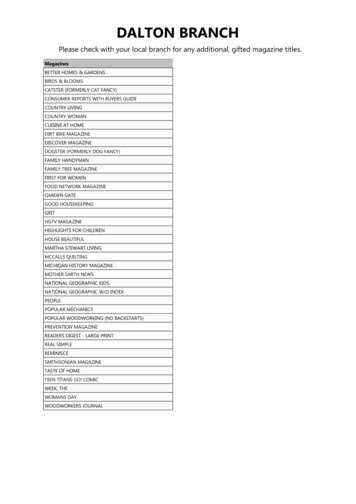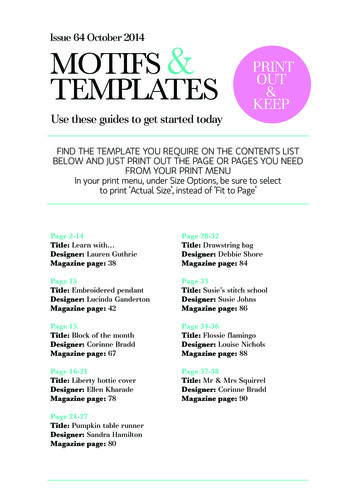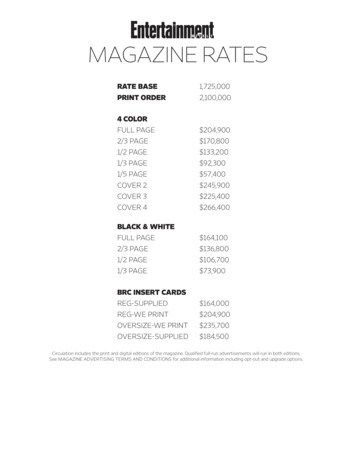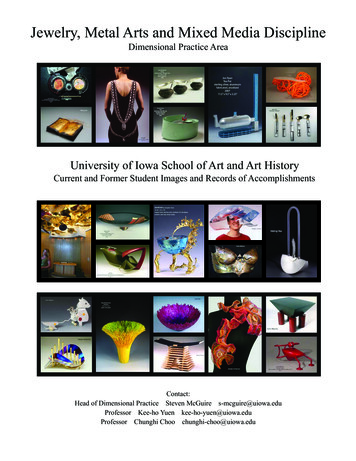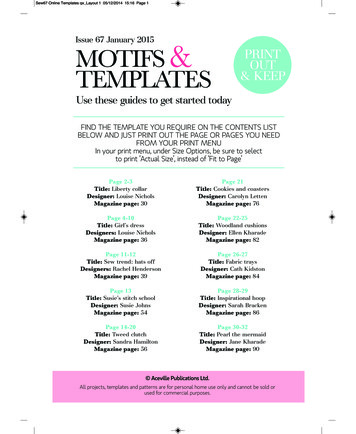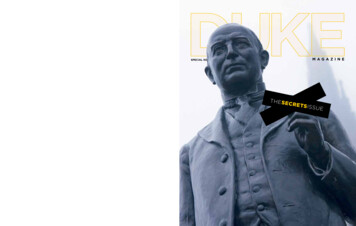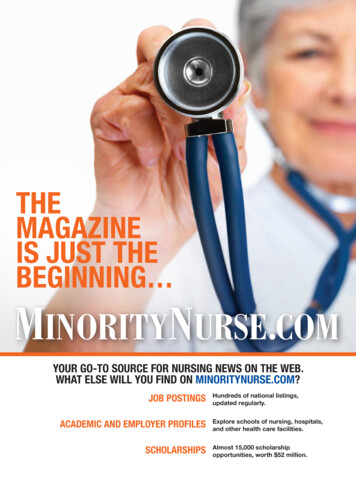
Transcription
THEMAGAZINEIS JUST THEBEGINNING.Minoritynurse .coMYOUR GO-TO SOURCE FOR NURSING NEWS ON THE WEB.WHAT ELSE WILL YOU FIND ON MINORITYNURSE.COM?JOB POSTINGSACADEMIC AND EMPLOYER PROFILESSCHOLARSHIPSHundreds of national listings,updated regularly.Explore schools of nursing, hospitals,and other health care facilities.Almost 15,000 scholarshipopportunities, worth 52 million.
Table of ContentsIn This IssueCover Story3Editor’s Notebook4Vital Signs7Making Rounds8Letter to the Editor40In the Spotlightexperience under your belt, you will want to develop these skills to43Highlights from the Blogsucceed at any career juncture48Index of AdvertisersAcademic Forum10 Skills for Success:What Every New Nurse NeedsBy Julia Quinn-SzcesuilWhether you have just graduated or you have a couple years ofFeatures16 How to Choose a Nursing School:From Traditional to Online andAccelerated Programs33 Improving Job Satisfactionand Lowering Turnover RatesBy Deborah Dolan Hunt, PhD, RNBy Linda ChildersFind out why job satisfaction mattersNavigate through the influx of traditional, accelerated, and onlinenursing programs being offered across the country to choose theright nursing program for youSecond Opinion36Dealing With New-Nurse Drama22 Finance Your Nursing SchoolEducation with ScholarshipsBy Eliss CucchiaraBy Jebra Turner Follow these 10 tips to overcome new-gradbullying in the workplaceFollow the advice of six money-savvy individuals to learn how tofinance your nursing education without going into deep debtDegrees of Success38Current Nursing School Diversity EffortsBy Terah Shelton Harris Discover what some nursing schools areoffering to attract more minority students28The Rise of Mobile Health AppsBy Robin FarmerLearn how apps are impacting patient care and why nurses needto take a more active role in their development2Minority Nurse FALL 2015
Editor’s Notebook:CORPORATE HEADQUARTERS/EDITORIAL OFFICEThinking Outside the BoxIt’s no secret that being a nurse is not for the faint of heart, but being a nursingstudent isn’t easy, either. You’ve got to worry about finding the right school, paying for your education, keeping up with technology, avoiding new-nurse bullies,and landing that first job. And that’s before you even step into your first role as aworking nurse! To help prepare you for the journey ahead, this issue is jam-packedwith advice on how to overcome the obstacles facing current students and recentgraduates alike.Have you ever wondered what traits are necessary to succeed as a nurse, regardlessof specialty, experience level, or location? A desire to help others is a given, but weconsulted experienced nurses to help you think outside the box. Julia Quinn-Szcesuilshares which skills you should hone to stay ahead of the curve now and throughoutyour career.With over 2,000 nursing schools in the United States, it can be overwhelming todecide which will meet your academic and professional goals. For instance, an onlineprogram offers flexibility, but an accelerated program will help you get that degreefaster. Linda Childers helps you weigh your options when considering whether a traditional, online, or accelerated nursing program is right for you.Arguably, the most important factor when it comes to selecting a school is the cost,but don’t let that deter you. Six money-savvy individuals share their wisdom in JebraTurner’s feature to help you win that coveted scholarship. Money aside, a university’scommitment to diversity should be taken into consideration as well. Terah SheltonHarris highlights what some nursing schools are currently doing to attract more minority students and diversify the workforce.As a young nurse, you have the advantage of growing up surrounded by technology. Pinpointing the essential apps for all nurses is an impossible task since nurseswork in a variety of settings and have different technological needs, but one thing’sfor certain: nurses will need to play a more active role in their development goingforward. Robin Farmer discusses the current trends in mobile health apps and what’sin store for the future.Feeling overwhelmed by your first job hunt? Be careful not to overlook management style or work environment when looking at a potential employer; recent studieshave shown that a positive work environment is crucial to job satisfaction. DeborahDolan Hunt investigates what causes a nurse to quit, and Eliss Cucchiara offers newgrads advice to avoid workplace drama.Finally, if you need a little inspiration, look no further than this year’s scholarshipwinners, highlighted in this issue’s “In the Spotlight” section. These three outstanding nursing students are pursuing their dreams—and so should you.— Megan Larkin11 West 42nd Street, 15th FloorNew York, NY 10036212-431-4370 n Fax: 212-941-7842SPRINGER PUBLISHING COMPANYCEO & Publisher Theodore NardinVice President & CFO Jeffrey MeltzerMINORITY NURSE MAGAZINEPublisher James CostelloEditor-in-Chief Megan LarkinCreative Director Mimi FlowProduction Manager Diana OsborneDigital Media Manager Andrew BennieMinority Nurse National Sales ManagerPeter Fuhrman609-890-2190 n Fax: 609-890-2108pfuhrman@springerpub.comMinority Nurse Editorial Advisory BoardJose Alejandro, PhD, RN-BC, MBA, CCM, FACHEImmediate Past PresidentNational Association of Hispanic NursesTeresita Bushey, MA, APR-BCAssistant Professor, School of NursingThe College of St. ScholasticaWallena Gould, CRNA, EdDFounder and ChairDiversity in Nurse Anesthesia Mentorship ProgramConstance Smith Hendricks, PhD, RN, FAANProfessorAuburn University School of NursingSandra Millon-Underwood, PhD, RN, FAANProfessorUniversity of Wisconsin, Milwaukee, College of NursingTri Pham, PhD, RN, AOCNP-BC, ANP-BCNurse PractitionerThe University of Texas-MD Anderson Cancer CenterMinority Nurse (ISSN: 1076-7223) is published four times per year by Springer Publishing Company, LLC, New York.Articles and columns published in Minority Nurse represent the viewpoints of the authors and not necessarily those of theeditorial staff. The publisher is not responsible for unsolicited manuscripts or other materials. This publication is designedto provide accurate information in regard to its subject matter. It is distributed with the understanding that the publisheris not engaged in rendering legal or other professional services. If legal advice or other expert assistance is required, theservices of a competent professional person should be sought. The publisher does not control and is not responsible for thecontent of advertising material in this publication, nor for the recruitment or employment practices of the employers placingadvertisements herein. Throughout this issue, we use trademarked names. Instead of using a trademark symbol with eachoccurrence, we state that we are using the names in an editorial fashion to the benefit of the trademark owner, with nointention of infringement of the trademark.Ronnie Ursin, DNP, MBA, RN, NEA-BCParliamentarianNational Black Nurses AssociationVarsha Singh, RN, MSN, APNPR ChairNational Association of Indian Nurses of AmericaSubscription Rates: Minority Nurse is distributed free upon request. Visit www.minoritynurse.com to subscribe.Change of Address: To ensure delivery, we must receive notification of your address change at least eight weeks prior topublication. Address all subscription inquiries to Springer Publishing Company, LLC, 11 West 42nd Street, 15th Floor, NewYork, New York 10036-8002 or e-mail subscriptions@springerpub.com.Claims: Claims for missing issues will be serviced pending availability of issues for three months only from the cover date (sixmonths for issues sent out of the United States). Single copy prices will be charged for replacement issues after that time.Minority Nurse is a registered trademark of Springer Publishing Company, LLC. Copyright 2015 Springer Publishing Company, LLC. All rights reserved. Reproduction, distribution, or translation withoutexpress written permission is strictly prohibited.www.minoritynurse.comFor editorial inquiries and submissions:editor@minoritynurse.comFor subscription inquiries and address changes:admin@minoritynurse.comMinority Nurse Magazine@MinorityNurse3
Vital SignsNon-Hispanic Black WomenLess Likely to Survive Endometrial CancerNon-Hispanic black women with endometrial cancerhad worse outcomes than women in other racial/ethnicgroups diagnosed with the same subtype of endometrialcancer and at the same stage of disease, according toa study published in Cancer Epidemiology, Biomarkers& Prevention, a journal of the American Association forCancer Research.“Endometrial canceris the most commonly diagnosedgynecologic cancer in the United States andincidence rates have been rising for many years,” says Michele L. Cote, PhD, an associateprofessor of oncology at theBarbara Ann Karmanos Cancer Institute and Wayne StateUniversity School of Medicinein Detroit. “We set out to investigate whether the increasing incidence and mortalityfrom endometrial cancer areequally distributed by race/ethnicity and endometrial cancersubtype.“The most significant findingwas that non-Hispanic blackwomen had poorer outcomescompared with non-Hispanicwhite women diagnosed withthe same subtype of endometrial cancer and at the samestage of disease, while Hispanicand Asian women had similaror better outcomes comparedwith their non-Hispanic whitecounterparts,” adds Cote. “Prior studies have suggested thatdisparities in outcomes fromendometrial cancer might beexplained by differences in tumor subtype or stage at diagnosis, but our data suggest thatdisparities persist even whenthese factors are controlled for.”4Minority Nurse FALL 2015Cote and colleagues analyzedendometrial cancer incidenceand mortality data from theSurveillance, Epidemiology, EndResults (SEER) database, including only the 120,513 cases diagnosed from 2000 to 2011.Over the 12 years studied,endometrial cancer incidencerates increased among all racial and ethnic groups, withrates increasing fastest, at2.5% per year, among nonHispanic black women andAsian women. Non-Hispanicblack women had higher ratesof all the aggressive endometrial cancer subtypes thannon-Hispanic white, Asian,and Hispanic women.Mortality rates for the aggressive endometrial cancer subtypes were more than 1.5-foldhigher among non-Hispanicblack women compared withnon-Hispanic white women,while mortality rates for thesesubtypes were similar or lower among Asian and Hispanicwomen compared with nonHispanic white women.Analysis of overall five-yearsurvival rates showed thatnon-Hispanic black womenhad poorer survival at everystage of diagnosis, regardlessof endometrial cancer subtype,compared with non-Hispanicwhite women, while five-yearsurvival rates were similar orhigher among Asian and Hispanic women compared withnon-Hispanic white women.“It was somewhat surprisingthat the endometrial cancer survival disparity we identified waslimited to non-Hispanic blackwomen because many of thechallenges previously linkedto worse outcomes, including low socioeconomic statusand high rates of obesity anddiabetes, are also experiencedby Hispanic women, but thatpopulation did not have pooroutcomes,” says Cote. “We are,therefore, interested in investigating whether there are molecular differences in endometrialtumors of the same subtypefrom women of different racesor ethnicities diagnosed at thesame stage of disease.”According to Cote, a limitation of the study is that the dataanalyzed were from the SEERdatabase, which meant the researchers did not have tumorsamples and were, therefore,unable to perform a review ofthe tumor subtype to ensurethey had been classified correctly. In addition, SEER doesnot collect information onother factors that may be associated with incidence andsurvival, thus potential causesfor the disparities identified inthis study cannot be furtherexamined.For more information aboutthis study, visit cebp.aacrjournals.org.
Vital SignsANA Makes New RecommendationThat All Nurses Should Be ImmunizedAgainst Vaccine-Preventable DiseasesThe American Nurses Association (ANA) is calling forall individuals, including registered nurses (RNs), tobe immunized against vaccine-preventable diseases,with the only exemptions being for medical or religiousreasons.ANA’s new position onimmunization alignswith recommendations from the Centers for Disease Control andPrevention (CDC) and theAdvisory Committee on Immunization Practices, a CDCpanel of medical and publichealth experts that advises vaccine use. ANA’s re-examinationof its position was promptedpartly by outbreaks of measlescases this year that affected unvaccinated adults and children.“ANA’s new position alignsregistered nurses with the bestcurrent evidence on immunization safety and preventing diseases such as measles,”says ANA President Pamela F.Cipriano, PhD, RN, NEA-BC,FAAN. “A critical componentof a nurse’s job is to educatepatients and their family members about the effectiveness ofimmunization as a safe methodof disease prevention to protectnot only individuals, but alsothe public health.”During the first sevenmonths of 2015, the CDCsaid 183 people from morethan 20 states were reportedto have measles, with five outbreaks resulting in the majority of those cases. In 2000, theUnited States had declared thatmeasles was eliminated fromthe country as a result of aneffective measles vaccine anda strong vaccination programfor children.Health care personnel whorequest exemption for religiousbeliefs or medical contraindications—a condition or fac-tor that serves as a reason towithhold an immunization dueto the harm it would cause—should provide documentationfrom “the appropriate authority” supporting the request.Individuals who are grantedexemption “may be requiredto adopt measures or practices in the workplace to reducethe chance of disease transmission” to patients and others,the new policy says.ANA’s position on immu-www.minoritynurse.comnization for health care personnel aligns with the newlyrevised Code of Ethics for Nurses with Interpretive Statements,which says RNs have an ethicalresponsibility to “model thesame health maintenance andhealth promotion measuresthat they teach and research,”including immunization.Source: American Nurses AssociationMinority Nurse Magazine@MinorityNurse5
Vital SignsCDC Study Shows 1 in 5 Adults inthe United States Live with a DisabilityIn the United States, over 53 million adults have adisability, according to a new study published by theCenters for Disease Control and Prevention (CDC). Themost common functional disability type was a mobilitylimitation—defined as serious difficulty walking orclimbing stairs—reported by 1 in 8 adults, followedby disability in thinking and/or memory, independentliving, vision, and self-care.The researchers foundthat the highest percentages of peoplewith disabilities aregenerally in Southern states:Alabama (31.5%), Mississippi (31.4%), and Tennessee(31.4%). The report did notdetermine why differences occur by state; however, states inthe South tend to have someof the higher rates of chronicdiseases, such as heart diseaseand diabetes, which may alsobe associated with disability.“We are all at risk of having a disability at some pointin our lifetime,” says CDCDirector Tom Frieden, MD,6Minority Nurse FALL 2015MPH. “Health professionalsand health care systems needto meet the needs of this growing population.”The report also revealed thatnon-Hispanic black (29%) andHispanic (25.9%) adults weremore likely to have a disabilitythan were white non-Hispanic (20.6%) adults. Those withlower education levels and lower incomes, and those who areunemployed were also morelikely to report a disability.“For the past 25 years, theAmericans with DisabilitiesAct has made a positive difference in the lives of thosewho have disabilities by ensur-ing better access to buildings,transportation, and employment. Access to preventivehealth care is also criticallyimportant for those with disabilities,” says Georgina Peacock, MD, MPH, Director ofCDC’s Division of HumanDevelopment and Disability.“Many of the health issuesthat people with disabilitiesface may be addressed by making sure they have access tohealth promotion programsand health care services, including preventive healthscreenings, throughout theirlifespan.”The CDC is committed toprotecting the health andwell-being of people withdisabilities throughout theirlives. Through its state-baseddisability and health programsand national collaborations,the CDC will continue to workto reduce health disparitiesfaced by people with disabilities by facilitating their inclusion in public health surveys,public health programs, emer-gency preparedness and planning efforts, and accessiblehealth care services. To worktoward this goal, the CDCprovides data, information,and resources for public healthpractitioners, health care providers, and people interestedin the health and well-being ofpeople with disabilities.Although disability information has been collectedin national surveys for manyyears, this was the first timethat functional disability typewas included in the Behavioral Risk Factor SurveillanceSystem (BRFSS). The BRFSS isan annual, state-based telephone survey conducted bystates in collaboration withthe CDC that gathers information on demographics, healthstatus, health behaviors, anddisabilities.More information about theCDC’s work to support inclusive public health and healthcare settings is available atwww.cdc.gov/disabilities.
Making RoundsOctoberNovemberFebruary15-175-624-27Annual Conference on Transforming Health, Driving PolicyGrand Hyatt WashingtonWashington, District Of ColumbiaInfo: 202-777-1170E-mail: info@AANnet.orgWebsite: www.aannet.org/20152015 Interdisciplinary ConferenceCatholic University of AmericaWashington, District of ColumbiaInfo: 217-328-0405E-mail: support@agingandsociety.comWebsite: http://agingandsociety.com/2015-conference30th Annual ConferenceColonial Williamsburg LodgeWilliamsburg, VirginiaInfo: 877-314-7677E-mail: info@snrs.orgWebsite: www.snrs.org/2016annual-conference23-266-846th Annual ConferenceRio All-Suites Hotel & CasinoLas Vegas, NevadaInfo: 888-827-7862E-mail: suna@ajj.comWebsite: www.suna.org/event/2015-annual-conference2015 Annual World CongressOmni William Penn HotelPittsburgh, PennsylvaniaInfo: 412-344-1414E-mail: isongHQ@msn.comWebsite: www.isong.org28-31Transcultural Nursing SocietySigma Theta Tau International,Honor Society of Nursing41st Annual ConferenceRed Lion Hotel/Jantzen BeachPortland, OregonInfo: 888-432-5470E-mail: staff@tcns.orgWebsite: www.tcns.org43rd Biennial ConventionAria Resort and CasinoLas Vegas, NevadaInfo: 888-634-7575E-mail: events@stti.orgWebsite: www.nursingsociety.org28-3113-1529th Annual ConferenceDisney’s Coronado Springs ResortLake Buena Vista, FloridaInfo: 855-863-2762E-mail: lhoop@apna.orgWebsite: www.apna.org2015 Annual ConferenceHyatt Regency Jacksonville RiverfrontJacksonville, FloridaInfo: 877-966-6236E-mail: oadn@oadn.orgWebsite: www.noadn.orgAmerican Academy of NursingSociety of Urologic Nursesand AssociatesAmerican PsychiatricNurses AssociationAging and SocietyInternational Society ofNurses in Genetics7-11National Organization forAssociate Degree NursingSouthern Nursing Research SocietyMarch3-5National Association ofClinical Nurse Specialists2016 Annual ConferenceLoews Philadelphia HotelPhiladelphia, PennsylvaniaInfo: 215-320-3881E-mail: info@nacns.orgWebsite: http://nacns.org4-7Asian American Pacific IslanderNurses Association2016 Conference at Sea3-day Baja Mexico CruiseCarnival Inspiration (Port: LosAngeles, California, at Long Beach)E-mail: info@aapina.orgWebsite: http://aapina.org31 - November 4American Public Health Association143rd Annual Meeting and ExpositionMcCormick PlaceChicago, IllinoisInfo: 202-777-2742E-mail: annualmeeting@apha.orgWebsite: inority Nurse Magazine@MinorityNurse7
Letter to the EditorIwanted to comment on a wonderful story you published in the 2015 summer issuenoting the extraordinary accomplishments of Congresswoman Eddie Bernice Johnsonof Texas.I had the fortuitous honor to meet Congresswoman Johnson at a Nurses Week celebration at Parkland Health & HospitalSystem in Dallas. As the new executive vice president and chief nursing officer at Parkland, I was impressed withCongresswoman Johnson’s background, leadership role in Congress, nursing leadership at the VA, commitment to herconstituents, and honorable understated demeanor. She was lovely to know both inside and outside due to her aura ofcaring and commitment.Thank you for recognizing this extraordinary nurse, leader, and trailblazer, as she truly has been an inspiration overdecades. Reading her story, I believe, will inspire and encourage others to know that they, too, can change the worldthanks to leaders like Congresswoman Johnson. I am honored to have met her and to learn about the difference shehas made in nursing and in Congress.—Karen Watts, MSN, RN, NEA-BCExecutive Vice President and Chief Nursing Officer, Parkland Health & Hospital SystemCivilian Nursing CareersCare for military personnel, their families,and beneficiaries at Army hospitals andclinics worldwide.» Rewarding Careers» Exceptional Benefits» Opportunities Worldwide » Flexible Work SchedulesSearch jobs online today atCivilianMedicalJobs.comVast OpportunitiesExceptional BenefitsRewarding CareersArmy Medicine Civilian Corps employees are NOT subject to militaryrequirements such as "boot camp," enlistments or deployments.THE DEPARTMENT OF DEFENSE IS AN EQUAL OPPORTUNITY EMPLOYER.8Minority Nurse FALL 2015CivilianMedicalJobs.comFIND JOBSPOST RESUMESAPPLY TODAY
MINORITYNURSESCHOLARSHIP PROGRAMSponsored by the National Coalition of EthnicMinority Nurse Associations (NCEMNA)and Minority Nurse MagazineWe are currently accepting applications for our 17thannual scholarship competition, consisting of two 1,000 awards and one 3,000 award. Selectionswill be made by NCEMNA. Scholarships will be paidin summer 2016 for the fall 2016 academic term.Who Is EligibleTo apply for this scholarship, students mustmeet all four of the following criteria:Be a minority in the nursing professionBe enrolled in the United States (as of September 2016) in either: The third or fourth year of an accredited BSN program; or An accelerated program leading to a BSN degree(such as RN-to-BSN or BA-to-BSN); or An accelerated master’s entry program in nursing for students withbachelor’s degrees in fields other than nursing (such as BA-to-MSN)Note: Graduate students who already have a bachelor’s degree in nursing are not eligible.Have a 3.0 GPA or better (on a 4.0 scale)Be a U.S. citizen or permanent residentHow to ApplyComplete the form at ation and attach the following documents:Transcript or other proof of GPALetter of recommendation from a faculty memberoutlining academic achievementA brief (250-word) written statement summarizing youracademic and personal accomplishments, communityservice, and goals for your future nursing careerImportant: An English translation must be provided forany documentation that is not in EnglishDeadline for application: February 1, 2016Questions? E-mail ity Nurse Magazine@MinorityNurse9
Skills for SuccessWhat EveryNew NurseNeeds10Minority Nurse FALL 2015
BY JULIA QUINN-SZCESUILNo one can say nursing is a stagnantprofession. Even freshly minted gradscan feel they are scrambling to keepup with new procedures, technologies,treatments, and processes. If you’re anurse, you might start to wonder whatskills you will need to succeed and staycurrent in the coming years.There are a few qualities shared by all successful nurses.Being an excellent multitasker, having empathy, andbeing nearly obsessed with details never failed a nurse.No matter what your specialty, your location, or youraspirations, experts agree that a few skills in your wheelhousewill not only advance your career, but also help you satisfyyour goals of being the best nurse for your patients.“The first thing you have to have if you want to be the bestnurse possible is you have to really want to do it,” says LeighGoldstein, assistant professor of clinical nursing at the University of Texas at Austin School of Nursing. “You really have towant to be a nurse and not just bring people pills and plumppillows. To get there, you have to put in the hours and put inthe study. There’s that little thing in you that tells you, ‘This isit,’” says Goldstein. “It makes learning all the other skills easier.”LaDonna Northington, DNP, RN, BC, professor of nursingand the director of the traditional nursing program at the University of Mississippi Medical Center, agrees that nurses need apassion for the job. “This is not for the faint of heart,” she says.Looking ahead, here are some of the essential skills nurseswill need to meet job demands at any career juncture.www.minoritynurse.comMinority Nurse Magazine@MinorityNurse11
Develop Critical Thinking/Critical ReasoningThe best nurse thinks outside the box. Adapting tochanging situations, uniquepatient presentations, unusualmedication combinations, anda rotating team takes awareness. Assessing and evaluatingthey often have essentialtechnological familiarity.“Most nurses are probablyaware that the world of electronics has just taken over,”says Barbara Vaughn, RN,BSN, BS, CCM, chief nursing officer of Baylor MedicalCenter in Carrollton, Texas.Being an excellent multitasker, having empathy,and being nearly obsessed with details never faileda nurse.the whole picture by using thecritical thinking developed inschool and on the job is essential to success.“Nursing is not like workingin a bank,” says Goldstein.“It’s not 9 to 5. It’s always aunique set of circumstances.You have to tailor and adjustthe care you deliver based onthe picture the patient is giving you.”According to Northington,nothing in nursing is static. Nurses can’t usually justtreat one patient issue—theyhave to determine how thepatient’s diagnosis or diseasehas affected them across thelifespan, she says. And nurseshave to consider not just thebest choice for the patientand the best option for thenurse right now, but they alsohave to consider those thingsin light of the city they are in,the timing, and the resourcesthey have at hand or that areavailable to them.Make Friends withTechnologyNursing moves fast, buttechnological advances aresometimes even faster. Whilenew nurses might lack yearsof direct patient experience,12Minority Nurse FALL 2015“The more senior nurses whodidn’t grow up in the technology world tend to strugglemore than nurses who grewup with that.”With apps that allow nurses to determine medicationdosages and interactions andwebsites that allow patientsaccess to electronic healthrecords, technology is an integral part of modern nursing. “Technology is changing how we practice and willchange how nurses functionin the future,” says Vaughn.The benefits are incredible.Instead of having to make thetime-consuming drive intothe ER when needed for anemergency, a specialist mightnow be able to save preciousminutes by first examininga patient remotely with thehelp of monitors and evenrobotic devices. Nurses willhave to adapt to this new wayof doing things.Nurses have to practicewith technology to gain afluent understanding, saysVaughn. Vaughn, who isstudying for her PhD, saysshe didn’t grow up with online training as the norm, sowhen her new classes requiredonline work, she wasn’t pre-pared. Realizing this could bea hindrance, Vaughn askednewer nurses about how todo things, and she practicednavigating the system untilshe became better at it.Whether you are accessingpatient records, navigating online requirements for a class,or learning a new medicationscanning program, technology will improve your workday and help you take bettercare of your patients. In themeantime, Vaughn just recommends playing around withthe computer when faced withsomething new. In her owndepartment, Vaughn recallssome nurses who were especially stressed out about learning the new electronic healthrecords system. With trainingand practice, they excelled.“They were later identified assuperusers for their unit,” saysVaughn with a laugh.Adapt to the Broader PictureWith all these developmentscomes new and greater responsibility.“As an inpatient nurse, youused to worry about the 4 to 6days when the patient was un-patient arrived at the hospital,but also think about working with the care team to givespecific instructions for whenpatients get home that will bepractical.“The more specialized medicine gets, the more fragmented health care becomes,” saysNorthington. Technology andthat broad view can help reignthat all in—and nurses need toknow how the puzzle pieces fittogether and where and howpatients are receiving care.“More patients will befollowed in nontraditionalhealth care settings,” saysVaughn. “Our world and theworld we know is going tochange,” says Vaughn of thehealth care industry. Withmore patients being followedby health care centers in easily accessed sites like Walmartand Walgreens, telemedicineis going to become more important to understand and tonavigate.Practice EffectiveCommunicationThirty years ago, communication about patient care waseffective, but certainly not atWhether you are accessing patient records, navigating online requirements for a class, or learninga new medication scanning program, technologywill improve your work day and help you take better care of your patients.der your care,” says Vaughn.“Now if you are in a hospitalbased setting, you are goingto be more involved in patient population health.” Thatmeans an inpatient nurse notonly has to get the whole storyof what happened before thetoday’s level, says Northington. “We have to communicate,” she says. “You have toask, ‘What do you know thatI don’t know that can help thispatient?’ or ‘Are these therapiescontr
Auburn University School of Nursing Sandra Millon-Underwood, PhD, RN, FAAN Professor University of Wisconsin, Milwaukee, College of Nursing Tri Pham, PhD, RN, AOCNP-BC, ANP-BC Nurse Practitioner The University of Texas-MD Anderson Cancer Center Ronnie Ursin, DNP, MBA, RN, NEA-BC . program offers flexibility, but an accelerated program will .



